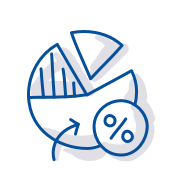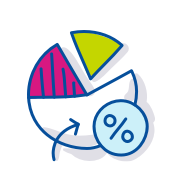Once again in 2018, the Swedish Childhood Cancer Fund reports very high fundraising results. What is your view of the positive trend?
Jens Schollin: We work with issues that really touch people’s hearts, so it is no surprise that we see a lot of involvement. We are pleased to have been able to convert that emotion into more donors. We work hard to explain how we use the funds we collect, and we can point out concrete impacts of our work. I also think that more people have begun to understand that research is critical if we are to eradicate childhood cancer in the long term.
Thorbjörn Larsson: I also think our holistic approach to combating childhood cancer is another reason we are reaching more people. Even if funding research is one of our cornerstones, we also provide concrete support to children with cancer and their families, as well as information campaigns that shine a spotlight on childhood cancer. Our presence throughout the country also helps to ensure that more people understand the importance of supporting the Swedish Childhood Cancer Fund.
What issues have been particularly important to address this past year?
JS: We run big, multifaceted operations on small means, so we must constantly work to ensure that our existing and long-term initiatives have as much impact as possible. IT is also important to ensure that we use our donors’ money in the right way. In addition, we are planning more international research collaborations. Sweden is a small country and we see a potential in contributing to more collaborative efforts in which frontier research meets across national boundaries. This is a long-term initiative that over time will help Swedish children who are affected by cancer. Currently we are working with international top researchers from several countries with an extensive examination of the research we fund. This is a type of collaboration that we think will be very valuable to both the Swedish Childhood Cancer Fund and our international counterparts.
In addition to the positive events of the year, we have unfortunately also had to deal with a situation that negatively affected our performance. One of our suppliers neglected to transfer a large sum of money from our corporate partners. Naturally, this is unacceptable. As well as tightening up our own routines even more, we now await prosecution of that company’s CEO. In the future, we will personally manage all contacts with the companies that support our fight against childhood cancer.
You are increasingly visible in the public debate and you work to shape opinion – why?
JS: We think it is very important to spread knowledge and raise awareness of childhood cancers. At the same time, we have decided to actively pursue the issues we consider important in order to improve the situation of children who are affected by cancer. One example is our efforts to get the Swedish government to fulfil its promise from last summer of a significant investment in cancer care with funds specifically earmarked for paediatric cancer care. Now it seems to be coming true.
TL: There is an enormous strength in our organisation. We have extensive knowledge at every level, from our skilled researchers to all the members in the regional associations who have practical experience of what it is actually like to live with childhood cancer. I think we can profile ourselves even more clearly as experts, as an organisation that can offer solutions and dare to take a stand on important issues.
Looking forward, what is your take on the years to come?
JS: We definitely have several issues on the agenda, above all ensuring that existing operations work as well as possible and that we create the best possible benefit with the funds we raise. We also want to fuel developments in several areas that are important to us, such as following up survivors of childhood cancer. This involves encouraging those in charge of healthcare to take responsibility and develop follow-up routines. Two other vital issues are enhancing psychosocial support to children with cancer and their families and providing access to new pharmaceuticals for children with cancer. I would also like to mention the long-term research initiatives that we at the Swedish Childhood Cancer Fund are funding. Our grants to research achieved new record levels in 2018, and we will see these important initiatives through over the course of several years.
TL:The prospects of achieving our long-term goals are good, but I do not want us to settle for that. I see several areas in which we can take a conscious step forward. We will make it easier for major donors to support the Swedish Childhood Cancer Fund, for example associations and individuals. I also see the internationalisation of research funding as a key issue, while at the same time we must continue to develop our own work in influencing. You could describe these two aspects as a pair of hands working in different ways towards the same goal. The one hand is leading the work to eradicate childhood cancer and improve living conditions for the young patients and their families. The other is working to improve conditions in the healthcare system that are necessary for saving lives.
In closing, Thorbjörn Larsson, the new secretary general since the start of 2019. How do you want to develop operations in the future?
TL: I have a deep respect for the task, and I look forward to employing my experience from the healthcare system, politics, research and fundraising to improve an already strong organisation. We have a key mission, but we need to keep our priorities straight. I want to promote an internationalisation of research, and to ensure that the Swedish Childhood Cancer Fund continues to be a strong, clear voice on important issues. I also want to contribute to achieving our vision of eradicating childhood cancer once and for all, as well as helping to provide a dignified, meaningful life for children who are affected by cancer.

 Start
Start
 2018 in brief
2018 in brief
 Our task
Our task
 Our strategy
Our strategy
 Your donation
Your donation
 Impact report
Impact report
 Financials
Financials
